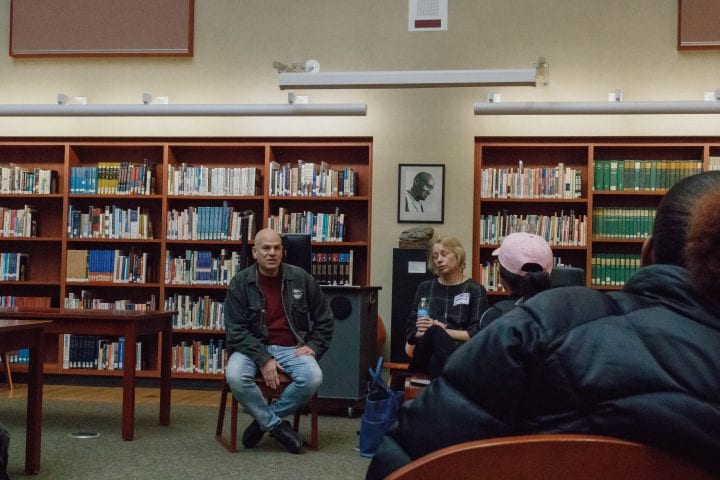
Pathways to Writing for the Screen and Novel
April 2, 2018
By BreAnna Girdy, WITS Intern
On Friday, March 30th, Laura Lippman and David Simon spoke to a crowd of over twenty students at Garfield High School as part of our Writers in the Schools program. With collective expertise in journalism, both Lippman and Simon offered a broad perspective into the writing world; they were able to provide for the students a unique insight into the life of a writer.
Lippman began by sharing what she called the “Sports Announcer 5-Word Rule.” “Have a take, don’t suck,” she said, and when she received nothing but confused glances, she continued to elaborate. This five-word rule demands that you, as a writer, need to have something to say. And, on top of that, you have to say something that doesn’t suck.
“What were they trying to do?” Lippman reminded the students to ask when reading any novel. “Did they really feel this stuff?”
Lippman and Simon shared the responsibility in describing how the students could become the writers they aspired to be. The first rule is to read. “Who do you admire,” Simon asked. “Who do you detest?” He insisted that the students take time to read works from both of these categories.
“How are they selling this argument that’s so bad?” Simon challenged, speaking of writers the students may not like. “Are they effective at it?”
For writers the students may enjoy, Simon urged them to recognize that every possible thing that could be written has already been written, leaving you no choice but to steal from the works that you read. “But if you read both works you enjoy and despise,” David continued, “You’ll end up stealing from everyone. By stealing from everybody, you steal from no one.”
But writing, as exemplified by Lippman’s and Simon’s long careers, takes time. It takes dedication. Lippman shared tips on how to effectively devote time to writing a novel. “Break things down into relatively small tasks that you can achieve,” Lippman advised. She herself got up at 6:00 am every morning and wrote for two hours. Her goal of 1,000 words a day was effectively a piece of cake. “When the writing is good,” Lippman spoke of her own writing and others, “You will excuse the unanswered questions.”
After providing insight into the writing process, both Lippman and Simon shared the process of getting published both for the screen and for novels. Lippman agreed, in this day and age, it is easy to get self-published. “But I do not recommend self-publishing,” she stated. While she recognizes the path to getting published as a difficult road to continuously follow, she outlined five key points to the publishing process.
“First, you have to have work to show,” she said. “No one is going to look at an unfinished manuscript, and they won’t look at an idea either.” After that, she suggested the students find a literary agent. Before choosing, however, she strongly advised doing their research. “What’s your favorite book? Chances are, the author put the name of their literary agent under the acknowledgements. But make sure you look for an agent who falls in love with you.”
After that, Lippman reminded the students to have a stronger determination and that they will have to really want to be published. “People are going to tell you why you aren’t good enough,” she stated, but followed up by insisting that students persist. Lippman finished her piece by saying, “What I write tomorrow had to be better than what I wrote today.”
Picking up on her momentum, Simon added, “Ask yourself, ‘Why does this story need to exist, and why do I have to tell it?’ Is this the way the world is and no one is seeing it? I want to make you see it and make you feel it.” Drawing references from television, Simon used The Sopranos as an example:
“Anyone who has seen it knows it’s not just about gangsters,” Simon shared. “It relates to family, which is something we all have.”
Both Lippman and Simon ended on a good note by telling the students the key to making something different is by starting with the familiar. “It’s common to start near the cliché,” Lippman said. “Don’t feel bad if you start in the typical place, but ask: how you can make this yours?”
“How do I make this different,” Simon ended.
BreAnna Girdy is both an intern with Seattle Arts & Lectures, and President of the UW Odyssey community. As a University of Washington student, she studies the literary arts through the lens of technology. Her passions include reading, writing, exploring, and spreading literary arts awareness!